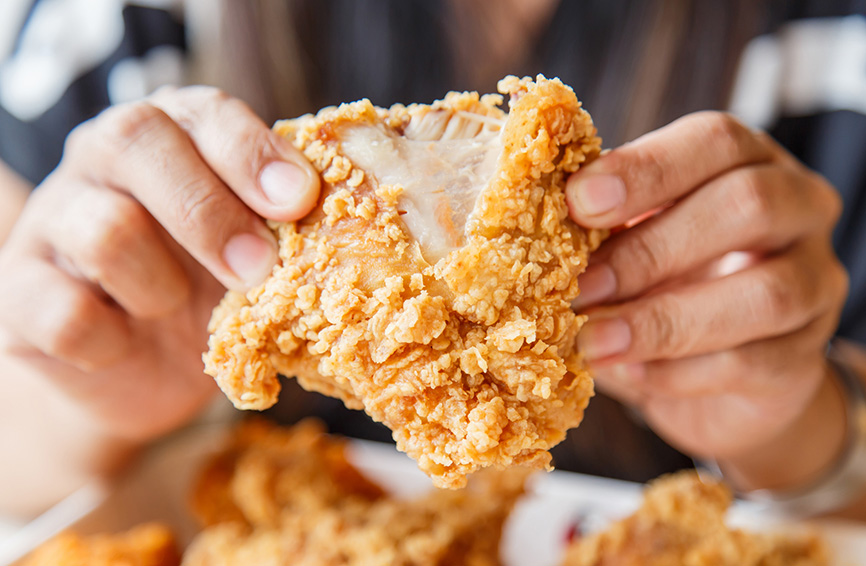Foods that are overly fatty, such as fried chicken, are very toxic for dogs, says Hartogensis. If they eat enough, such foods can cause inflammation of the pancreas, causing that organ to produce enzymes that can severely damage your pet’s intestines.
There is a possibility that the fried chicken’s grease will result in issues like pancreatitis or digestive upset. When Max starts vomiting, especially if it contains undigested food, that is a sign of pancreatitis, and he needs to see a veterinarian right away. … If you notice any of those symptoms, consult your veterinarian right away.
Get rates for your pet:See My Rates »

As summer picnic season approaches, many people will be packing or purchasing fried chicken to enjoy in the sunshine. You may be wondering if your dog can have a bite if he’s traveling with you.
Dogs enjoy cooked chicken, which is a secure source of protein, but fried chicken contains too many unhealthy fats and oils. Fried chicken is frequently prepared with seasonings that are toxic to dogs, like garlic and onion. Not only is the chicken skin fried, but it also contains a lot of fat, which could be extremely harmful to your dog if they eat it.
What Happens if Your Dog Eats Fried Chicken
As we’ve already mentioned, dogs can eat chicken, and they actually prefer it over other meats. They also have a natural tendency to eat anything that tastes or smells like chicken. You’ll discover that while your dog can consume fried chicken, that doesn’t mean they should.
Commercial fried chicken is of particular note in this instance, because, with very few exceptions, the fried chicken from your favorite fast-food shop is made with a breading as opposed to being simply skinned and fried with no additives. A dog could get down a piece of plain fried chicken in short order with few ill effects, but commercial chicken breading will usually have spices blended into the breading before it is applied.
It comes as a surprise to most pet owners to learn that some of the spices that humans like the best, including onion, garlic, salt, and pepper, can all take a serious toll on a dog’s digestive system. Dogs are by nature inclined to eat their food raw, and their digestive systems are not acclimated to spices in much the same way as ours are incapable of safely ingesting raw meat. Dogs are so badly built to handle spices that they lack even the taste receptors needed to process that food is spicy.
If dogs eat even moderate amounts of seasoning, they may become dangerously ill because they lack the necessary internal biology to break down the spices. Particularly toxic to dogs, garlic and onion cause internal chemical reactions that essentially short-circuit the chemistry of their stomachs. Although less harmful, salt and pepper can both cause unnatural changes in the dog’s water retention, which can result in compulsive drinking and extremely irregular urination.
Even in homemade or unbreaded fried chicken, a secondary effect results from the frying process itself. Since chicken is not an aquatic animal, it lacks the thick layer of subcutaneous fat that many other birds do. In contrast, cooking chicken in oil of some kind, especially if attempting a deep-fry, is required for duck, goose, or swan.
Although delicious, the resulting chicken will have so many extra calories that it is not a good idea for people to eat too much of it. A dog’s excess fat can cause pancreatitis, a painful and potentially fatal condition, which is a more serious issue than just caloric intake for canines.
When the pancreas, an organ in both humans and dogs that breaks down more difficult sugar and fat molecules, becomes overworked and stops working, pancreatitis develops. Most dogs are smaller than their owners, so a quantity of chicken that might only provide the owner with a full meal could result in the dog needing medical attention, particularly if the dog is older or does not lead an active lifestyle.
Pancreatitis
The condition known as pancreatitis causes the dog’s pancreas to become inflamed, usually as a result of auto-digestion. A number of factors can trigger pancreatitis. However, it is acknowledged that one of the main causes of the condition is excessive dietary fat consumption.
Dogs who have pancreatitis may exhibit symptoms such as vomiting, abdominal pain, distention, and decreased appetite.
The dog’s pancreatitis may be fatal if it is not treated right away.
FAQ
Can you give dogs fried chicken breast?
Short answer: Yes, dogs can eat cooked chicken as long as it’s been properly prepared. Due to its safety and ease of digestion, chicken is a popular ingredient in most dog foods, such as Public Goods Dog Food (which contains chicken and brown rice).
What happens if your dog eats fried chicken?
Dogs cannot eat fried chicken. Like other fried foods, it is loaded with fat and oil, which if consumed in excess can cause an upset stomach or life-threatening health issues like heart disease. Garlic and onion powder, which are both toxic to dogs, can be found in the breading used on fried chicken.
Are dogs allowed KFC chicken?
KFC chicken is safe for dogs to eat, but only the meat, with the breast being the best. Any bones in the meat must be removed immediately, and the fried batter should also be removed.
Does fried food hurt dogs?
No piece of your fried food is necessary for your dog. They run the risk of getting pancreatitis if they consume fried food. Similar to how eating nuts can result in pancreatitis, eating fried food can make dogs feel sick to their stomachs, hunch over, lose their appetite, throw up, get a fever, and have low energy.